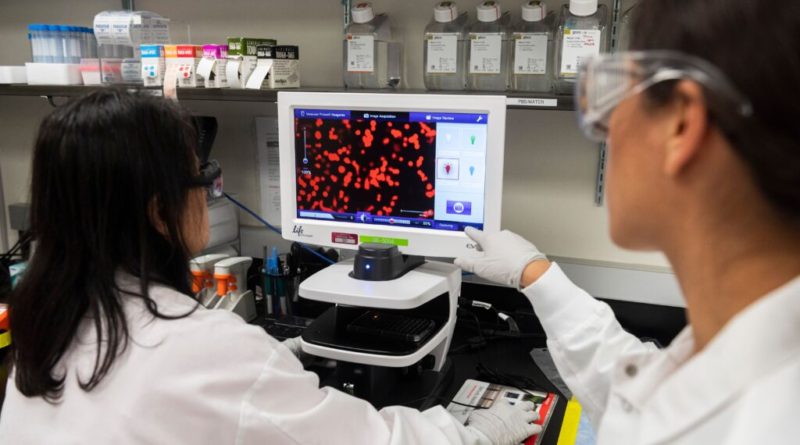Novavax’s Covid-19 vaccine shows promising immune response
A potential Covid-19 vaccine from the biotech company Novavax showed a promising immune response in a small, early trial, but not without a high rate of mostly mild side effects.
The results, published Tuesday, are the latest encouraging sign in the global effort to develop a vaccine for the novel coronavirus, which has killed nearly 700,000 people around the world. But the Novavax data, much like results recently published by Moderna and AstraZeneca, are too preliminary to draw any conclusions about how well the vaccine might protect against Covid-19, experts said.
“It’s a small number of people in each arm, and the study wasn’t designed to demonstrate efficacy, which are the standard caveats for a Phase 1 trial,” said Edward Belongia, an epidemiologist and vaccine researcher at the Marshfield Clinic Research Institute in Wisconsin. “Having said that, it looks very promising — at least as promising if not more so than the other vaccines we’ve looked at.”
advertisement
The data were published on a preprint server, meaning they have not yet been peer-reviewed.
Novavax enrolled about 130 healthy volunteers in its trial and gave them either a placebo or one of four escalating doses of its vaccine. Everyone who received the vaccine developed neutralizing antibodies against SARS-CoV-2, which may help prevent infection.
advertisement
The best responses came from volunteers who received two injections of Novavax’s vaccine three weeks apart, plus an adjuvant meant to boost its effects. After 35 days, those participants had neutralizing antibody levels that, on average, were roughly four times higher than what was seen in a group of 32 patients who had recovered from the disease.
About 80% of those volunteers had side effects at the site of injection, including pain and tenderness. More than 60% had other side effects, mostly headaches, muscle pain, and fatigue. Most reactions were mild or moderate, but eight patients had side effects that were graded severe; Novavax said none required hospitalization. All of the reactions resolved after a few days, and none was life-threatening.
The study, conducted in Australia, recruited a roughly even number of men and women between the ages of 18 and 59. Volunteers were about 79% white, 15% Hispanic, 13% Asian, 6% Indigenous, and 2% Black. The median age was 31.
Whether the vaccine’s demonstrated effect on neutralizing antibodies will protect people from Covid-19 remains unclear. Scientists are still mapping out the underlying mechanisms that drive immunity to SARS-CoV-2.
It’s also impossible to directly compare Novavax’s product, NVX-CoV2373, against other vaccines in development, said Kathryn Edwards, scientific director of the Vanderbilt Vaccine Research Program in Nashville, Tenn. Injections from Moderna, AstraZeneca, CanSino, and the partnership of Pfizer and BioNTech all elicited neutralizing antibodies in early trials, but each study used different methods to detect immune responses, meaning they can’t be judged on a head-to-head basis until there’s data on actual SARS-CoV-2 infection rates.
Overall, the Novavax trial is “another encouraging study that looks like the vaccine may be a potential winner, but efficacy and safety studies need to continue,” Edwards said.
Moderna, AstraZeneca, and Pfizer are all recruiting more than 30,000 volunteers each for placebo-controlled Phase 3 trials meant to determine whether their vaccines can prevent Covid-19. Novavax plans to begin a similar study of its own in the fall, joined by Johnson & Johnson, Sanofi, and others.
Novavax’s vaccine is among a handful being funded by Operation Warp Speed, a U.S. effort to develop treatments and vaccines for the novel coronavirus by the end of this year. The company is in line to receive $1.6 billion in federal funding, which will support its development efforts and pay for 100 million doses of NVX-CoV2373 if it proves to be safe and effective. The company is also receiving up to $388 million from the Coalition for Epidemic Preparedness Innovations, a nonprofit funded in part by the Bill and Melinda Gates Foundation.
NVX-CoV2373 is engineered to mimic a key protein found on the surface of SARS-CoV-2, simulating viral infection to compel the body to produce antibodies against Covid-19. Novavax, which has no approved products, has spent nearly three decades and $1.5 billion trying to develop vaccines with its technology.
An earlier version of this story incorrectly stated that trial volunteers who experienced severe reactions were hospitalized.




